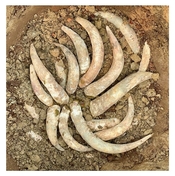 Allowing him to assume my skepticism was “healthy,” I (like many consumers and wine industry folks who believe in sustainability and oppose pesticides) become just a little skeptical when it comes to the buried cowhorn ritual and connecting farming to phases of the moon. BTW: the second thing I learned is that the cowhorn rituals are part of what is known as preparations or “preps,” various ways to reinvigorate the soil.
Allowing him to assume my skepticism was “healthy,” I (like many consumers and wine industry folks who believe in sustainability and oppose pesticides) become just a little skeptical when it comes to the buried cowhorn ritual and connecting farming to phases of the moon. BTW: the second thing I learned is that the cowhorn rituals are part of what is known as preparations or “preps,” various ways to reinvigorate the soil.
Those wacky sounding rituals are key to biodynamic farming, which was developed (as most lovers know) by its founder, Rudolph Steiner of Austria. After a century-long slog, the movement is growing, and today about 100 wineries in the US and an estimated 500 in Europe are Demeter Certified as biodynamic. Biodynamic growing, in a nutshell, “takes a holistic approach to regenerative agriculture and focuses on minimum outside intrusion. And one key is that unlike organic farming, it emphasizes naturally produced compost and biodiversity.” In other words, it is all about soils and manure. And insects, bugs, wild animals, and native plants.
At the end of the walk through the vineyards and gardens, I was convinced what Troon is creating is based upon solid scientific research, much of it recent. Though I’m still not buying into the moon stuff, the preps are also based on science. For example, prep #507 consists of Valerian, which is in “a liquid preparation that stimulates the phosphorus processes in the soil and forms a sort of warm, protective blanket around the compost, like the skin of an organism. It also has a secondary role in regulating magnesium and selenium.” Biodynamic Preparation 506, I’m sure you are anxious to hear, is made from dandelions which grow on the Troon farm.
Admittedly, science can be boring to a non-scientist, and there’s not much romance associated with composting and manure. But Troon truly has its manure together. Troon is not only certified organic and biodynamic but is now also Regenerative Organic certified. There are only two wineries making that claim today; the other is Tablas Creek. Both emphasize Rhône varieties which may be a coincidence but that caught my attention which was getting a little weak during the walk through the vineyard with what seemed like non-stop scientific talk.
Long, who holds a Master’s in Soils and Biogeochemistry from UC Davis, employs the “five principles of soil health” at Troon: “Composting, avoiding soil disturbance, keeping living roots growing, maximizing diversity, and integrating livestock.” Nowadays, Long adds that he is really “pushing the cover crop envelope.”
Troon, which was founded in 1972 and fell on hard times, was acquired in 2017 by Denise and Bryan White of Arlington, Texas. Soon the first steps were taken in an amazing long-term transformation. The estate consists of 100 acres, and 50 have been recently replanted to vines. It also has vegetable and herb gardens, a large lake, and sheep, chickens, dogs and bees. A new garden is devoted entirely to native plants, all planted from seed. Demeter requires that 10 acres be set aside for biodiversity, but they have exceeded that at Troon.
Located in the Applegate Valley of Southern Oregon, Troon is cutting edge and exploring new approaches to winemaking as it redefines a traditional winery and vineyard into an independent and diverse farm.
A solar barn is being built to eventually supply all electrical needs. Tractors and other farming machines will soon also be electric. Zero carbon footprint is the goal.
Most of the vines are head trained and the goal is to eventually dry farm all 50 acres. As for their gardens, the philosophy is “no till gardening with a seven-year crop rotation.” And the emphasis everywhere is on diversity.
Looking around at the vineyards, gardens, orchards, and compost heaps, I’m now convinced these are not science nerds, I’m in the presence of talented, forward-thinking agriculturists and winemakers. So far, nothing about the cycles of the moon from anyone.
When it comes to wines, Troon aims to capture a sense of place. In my earlier reviews of Troon’s Tannat and Vermentino posted here on WRO several weeks ago, both wines came across as unusual and exciting interpretations. But everything is just beginning to be put into place, and the estate vineyards are just coming into production.
Described as a transitional growing region between the Willamette Valley and Napa, Applegate Valley enjoys an elevation of 1,200-1,400 feet, surrounded by the Siskiyou Mountains and 60 miles from the Pacific Ocean. As I learned, Troon’s vineyards are located on the Kubli Bench, and this site is warmer and dryer than the Willamette Valley, but cooler and wetter than Napa. “It has a shorter growing season than Napa, but gets 70 minutes more of sunshine daily and no fog. As the days get shorter, sugar accumulation stops, resulting in fully ripened fruit and lower alcohol wines.” Four different soil types have been identified, and while no surprise to hear Syrah thrives on the gravely sites, Vermentino has proven to fare well on clay soils.
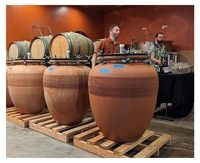 Moving on to current wines, winemaking is handled by Nate Wall, who previously worked for Beaux Freres. Armed with scientific information, he too follows the biodynamic approach. His explanation of the benefits of amphora and concrete eggs was spot-on. He does not add commercial yeasts, acids, sugar, tannins, or sulfur during the fermentation process which uses native yeasts. And all wines go through spontaneous malolactic fermentation. And yes, they are bottled unfined and unfiltered, but a little SO2 is added at the time of bottling. (And no, nothing about bottling being timed with the moon.)
Moving on to current wines, winemaking is handled by Nate Wall, who previously worked for Beaux Freres. Armed with scientific information, he too follows the biodynamic approach. His explanation of the benefits of amphora and concrete eggs was spot-on. He does not add commercial yeasts, acids, sugar, tannins, or sulfur during the fermentation process which uses native yeasts. And all wines go through spontaneous malolactic fermentation. And yes, they are bottled unfined and unfiltered, but a little SO2 is added at the time of bottling. (And no, nothing about bottling being timed with the moon.)
The winery is a mix of standard small stainless tanks and an oak barrel room, and opposite the barrels is a row of clay amphora and one concrete egg. The oak is mostly French but none of the wines are aged in new oak. Though armed with the latest equipment, Winters explains that, for maximum extraction of some wines, the grapes are foot stomped. For the varieties used for Amber or orange wines, “we performed extra leaf removal on these vines in the vineyard to allow for more sun penetration into the fruiting zone, further developing the skin tannins of the grapes.”
Favoring whites and Rosés, the current wine roster is a mix of the unusual and the conventional. There’s a pet-nat and an orange wine, and usual blends named Druid’s White and Druid’s Red. “Glou-Glou,” a Grenache made by carbonic maceration, is strange. But the Syrah and Tannat are both impressive. Whites relying on Vermentino are early standouts. Neither Chardonnay nor Pinot Noir seem to be in the game plan. The most recent plantings are to Negrette and Tiburon. Unfamiliar with Tiburon, I learned it plays an important role in Provence Rosés.
My guess is that with vine maturity, Troon will add more red wines to the mix.
Wines Tasted:
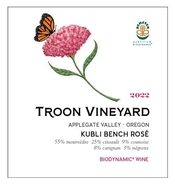 2022 Troon Vineyard Kubli Bench Rose, Applegate Valley ($25): Made from young vineyards coming into production, this Rose brings together Mourvèdre, Cinsault, Counoise, Carignan, and Negrette, all farmed to make rosé. Light pink in color, the wine is a charming, refreshing Rose with berry and spice flavors, a silky texture and good acidity. Modest in alcohol and crisp in the finish, it holds up well over time and is thoroughly enjoyable. 93
2022 Troon Vineyard Kubli Bench Rose, Applegate Valley ($25): Made from young vineyards coming into production, this Rose brings together Mourvèdre, Cinsault, Counoise, Carignan, and Negrette, all farmed to make rosé. Light pink in color, the wine is a charming, refreshing Rose with berry and spice flavors, a silky texture and good acidity. Modest in alcohol and crisp in the finish, it holds up well over time and is thoroughly enjoyable. 93
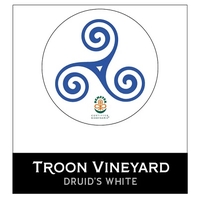 2021 Troon Vineyard Applegate Valley Druid’s White ($25): Labeled “Druid’s Fluid” until recently, this most recent white blend has a lot to offer. Made from 65% Vermentino, 22% Marsanne and 13% Roussanne, all harvested over a 10-day period. The Vermentino was foot trodden before its barrel fermentation. The time in used oak for primary and secondary fermentation averaged 8 months. With flavors of green apple, lemon zest and light spice, this wine’s appeal is mostly about texture and good balancing acidity. The flavors are clean orchard fruit (mainly pear) and the finish is vibrant. 90
2021 Troon Vineyard Applegate Valley Druid’s White ($25): Labeled “Druid’s Fluid” until recently, this most recent white blend has a lot to offer. Made from 65% Vermentino, 22% Marsanne and 13% Roussanne, all harvested over a 10-day period. The Vermentino was foot trodden before its barrel fermentation. The time in used oak for primary and secondary fermentation averaged 8 months. With flavors of green apple, lemon zest and light spice, this wine’s appeal is mostly about texture and good balancing acidity. The flavors are clean orchard fruit (mainly pear) and the finish is vibrant. 90
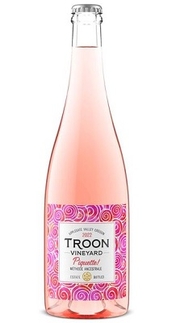 2022 Troon Vineyard Applegate Valley “Piquette” ($25): If you too don’t know what a piquette is, here’s the background: “It is frugal farmer fizz, a type of natural wine that has been made for hundreds, if not thousands, of years. Those frugal farmers wasted nothing. They would add water to the juice and skins left after pressing the wines they sell to make wine for themselves and their workers.” This Troon 2022 is more like a Pet-Nat with good body, alcohol and flavor. But it is still unusual being made from re-hydrated skins from several varieties, mainly reds destined for Roses. Winemaker Walls adds: “The remaining skins are rehydrated overnight in the press where it is pressed again the following morning. Then, a day or two later, the next lot of fruit comes into the winery that will also end up in the piquette.” And on and on. The result is a wine with an orange tinge and very fruity with pleasing slightly fizzy flavors. It captures some apple and fresh herbs which remain vibrant on the palate, but in an easygoing manner. 90
2022 Troon Vineyard Applegate Valley “Piquette” ($25): If you too don’t know what a piquette is, here’s the background: “It is frugal farmer fizz, a type of natural wine that has been made for hundreds, if not thousands, of years. Those frugal farmers wasted nothing. They would add water to the juice and skins left after pressing the wines they sell to make wine for themselves and their workers.” This Troon 2022 is more like a Pet-Nat with good body, alcohol and flavor. But it is still unusual being made from re-hydrated skins from several varieties, mainly reds destined for Roses. Winemaker Walls adds: “The remaining skins are rehydrated overnight in the press where it is pressed again the following morning. Then, a day or two later, the next lot of fruit comes into the winery that will also end up in the piquette.” And on and on. The result is a wine with an orange tinge and very fruity with pleasing slightly fizzy flavors. It captures some apple and fresh herbs which remain vibrant on the palate, but in an easygoing manner. 90
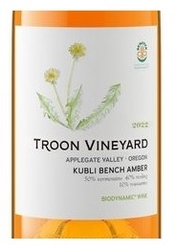 2022 Troon Vineyard “Kubli Bench Amber” Applegate Valley ($35): This one falls within the orange wine category and is made from 70% Vermentino, 25% Viognier, and 5% Roussanne. Each is fermented separately in open-top fermenters located outdoors, typically with about 30% whole-cluster inclusion. Fermentations proceed spontaneously with native yeasts, The Vermentino, grapes were foot tread before being loaded into the press, leading to a bit more extraction before being settled and transferred to neutral French oak barrels for fermentation. Light orange in color, this is a highly aromatic wine with a silky-smooth texture and flavors that expand nicely on the palate. With discernible acidity in the background, it finishes long. Despite being easy to drink on its own, it pairs well with food, including blue cheese. 92
2022 Troon Vineyard “Kubli Bench Amber” Applegate Valley ($35): This one falls within the orange wine category and is made from 70% Vermentino, 25% Viognier, and 5% Roussanne. Each is fermented separately in open-top fermenters located outdoors, typically with about 30% whole-cluster inclusion. Fermentations proceed spontaneously with native yeasts, The Vermentino, grapes were foot tread before being loaded into the press, leading to a bit more extraction before being settled and transferred to neutral French oak barrels for fermentation. Light orange in color, this is a highly aromatic wine with a silky-smooth texture and flavors that expand nicely on the palate. With discernible acidity in the background, it finishes long. Despite being easy to drink on its own, it pairs well with food, including blue cheese. 92
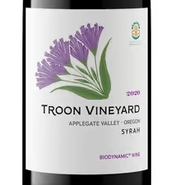 2020 Troon Vineyard Applegate Valley Estate Syrah ($35): About 33% was whole cluster fermented, and after a 4-week fermentation, the wine was pressed off and aged in neutral oak for 18 months. It is deep in color, but then offers plenty of ripe fruit, with black pepper in a medium bodied style. The bouquet is mostly reminiscent of black plums with a touch of thyme and pepper. The flavors are similar, but the palate impression is one of bright, lively fruit that seems more savory than powerful. Kind of understated elegance and balanced by good acidity. 250 cases made. 94
2020 Troon Vineyard Applegate Valley Estate Syrah ($35): About 33% was whole cluster fermented, and after a 4-week fermentation, the wine was pressed off and aged in neutral oak for 18 months. It is deep in color, but then offers plenty of ripe fruit, with black pepper in a medium bodied style. The bouquet is mostly reminiscent of black plums with a touch of thyme and pepper. The flavors are similar, but the palate impression is one of bright, lively fruit that seems more savory than powerful. Kind of understated elegance and balanced by good acidity. 250 cases made. 94
Syrah now joins my list of successes to date at Troon Vineyards. And at this early stage, the Troon team seems to be walking the walk. And that’s not a moon walk!
More columns: Wine Columns
More reviews: Wine Reviews
Connect with Norm on Twitter: @RobyWine67
